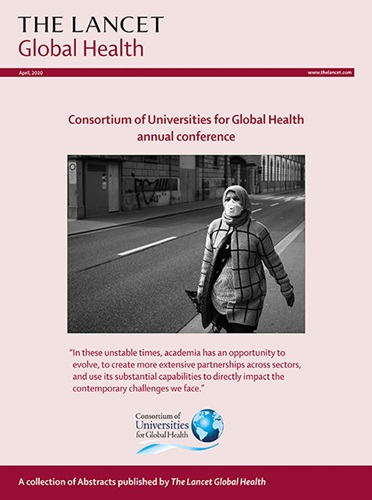The effect of intensive praziquantel administration on vaccine-specific responses among schoolchildren in Ugandan schistosomiasis-endemic islands (POPVAC A): an open-label, randomised controlled trial.
IF 19.9
1区 医学
Q1 PUBLIC, ENVIRONMENTAL & OCCUPATIONAL HEALTH
引用次数: 0
Abstract
BACKGROUND Vaccine responses differ between populations and are often impaired in rural and low-income settings. The reasons for this are not fully understood, but observational data suggest that the immunomodulating effects of parasitic helminths might contribute. We hypothesised that Schistosoma mansoni infection suppresses responses to unrelated vaccines, and that suppression could be reversed-at least in part-by intensive praziquantel administration. METHODS We conducted an open-label, randomised controlled trial of intensive versus standard intervention against S mansoni among schoolchildren aged 9-17 years from eight primary schools in Koome islands, Uganda. Children were randomly allocated to either an intensive group or a standard group with a computer-generated 1:1 randomisation using permuted blocks sizes 4, 6, 8, and 10. Participants in the intensive group received three praziquantel doses (approximately 40 mg/kg) 2 weeks apart before first vaccination at week 0, and every 3 months thereafter. Participants in the standard group were given one dose of approximately 40 mg/kg praziquantel after the week 8 primary endpoint. Participants in both groups received the BCG vaccine (Serum Institute of India, Pune, India) at week 0; the yellow fever (Sanofi Pasteur, Lyon, France), oral typhoid (PaxVax, London, UK), and first human papillomavirus (HPV) vaccination (Merck, Rahway, NJ, USA) at week 4; and the HPV booster and tetanus-diphtheria vaccine (Serum Institute of India) at week 28. The primary outcome was vaccine response at week 8 (except for tetanus and diphtheria, which was assessed at week 52). The primary analysis population was participants who were infected with S mansoni at baseline, determined retrospectively using either plasma circulating anodic antigen (CAA) or stool PCR. The safety population comprised all randomly allocated participants. The trial was registered at the ISRCTN Registry (ISRCTN60517191) and is complete. FINDINGS Between July 9 and Aug 14, 2019, we enrolled 478 participants, with 239 children per group. 276 (58%) participants were male and 202 (42%) participants were female. Among participants who were positive for S mansoni at baseline (171 [72%] in the intensive group and 164 [69%] in the standard group) intensive praziquantel administration significantly reduced pre-vaccination infection intensity (to median 30 CAA pg/mL [IQR 7-223] vs 1317 [243-8562], p<0·001) compared with standard treatment. Intensive praziquantel administration also reduced week 8 HPV-16-specific IgG response (geometric mean ratio 0·71 [95% CI 0·54-0·94], p=0·017), but had no effect on other primary outcomes. Among all participants (regardless of S mansoni status at baseline) intensive praziquantel administration significantly improved week 8 BCG-specific IFNγ ELISpot response (1·20 [1·01-1·43], p=0·038). Recognised adverse effects of praziquantel were reported more frequently in the intensive group. There were no recorded serious adverse events in either group. INTERPRETATION We show evidence suggesting that praziquantel administration improves the BCG-specific cellular response, but not humoral responses to other vaccines. Despite observational evidence that helminths impair vaccine response, these results show minimal immediate benefits of reducing helminth burden. The effect of longer-term helminth control should be investigated. FUNDING UK Medical Research Council. TRANSLATION For the Luganda translation of the abstract see Supplementary Materials section.乌干达血吸虫病流行岛屿学龄儿童强化服用吡喹酮对疫苗特异性反应的影响(POPVAC A):一项开放标签随机对照试验。
背景不同人群对疫苗的反应各不相同,在农村和低收入环境中,疫苗反应往往会受到影响。造成这种情况的原因尚不完全清楚,但观察数据表明,寄生蠕虫的免疫调节作用可能是原因之一。我们假设曼氏血吸虫感染会抑制对非相关疫苗的反应,而这种抑制可通过强化吡喹酮治疗得到逆转--至少是部分逆转。方法 我们在乌干达科奥米群岛 8 所小学的 9-17 岁学童中开展了一项开放标签、随机对照试验,对曼氏血吸虫进行强化干预和标准干预。孩子们被随机分配到强化组或标准组,采用计算机生成的 1:1 随机分配法,随机分配的区块大小为 4、6、8 和 10。强化组的参与者在第0周首次接种疫苗前接受三次吡喹酮治疗(约40毫克/千克),每次间隔2周,之后每3个月接种一次。标准组的参与者在第8周的主要终点之后接受一次约40毫克/千克吡喹酮的剂量。两组参与者均在第0周接种卡介苗(印度浦那血清研究所);第4周接种黄热病疫苗(法国里昂赛诺菲巴斯德)、口服伤寒疫苗(英国伦敦PaxVax)和首次人类乳头瘤病毒(HPV)疫苗(美国新泽西州拉威默克公司);第28周接种HPV强化疫苗和破伤风-白喉疫苗(印度血清研究所)。主要结果是第 8 周时的疫苗应答(破伤风和白喉除外,第 52 周时进行评估)。主要分析人群为基线感染曼森氏杆菌的参与者,通过血浆循环阳离子抗原 (CAA) 或粪便 PCR 进行回顾性测定。安全人群包括所有随机分配的参与者。该试验已在ISRCTN注册中心注册(ISRCTN60517191),并已完成。研究结果2019年7月9日至8月14日期间,我们共招募了478名参与者,每组239名儿童。276名(58%)参与者为男性,202名(42%)参与者为女性。在基线曼森氏杆菌检测呈阳性的参与者中(强化组171人[72%],标准组164人[69%]),与标准治疗相比,强化吡喹酮治疗显著降低了接种前的感染强度(中位数为30 CAA pg/mL [IQR 7-223] vs 1317 [243-8562],P<0-001)。强化吡喹酮治疗也降低了第8周的HPV-16特异性IgG反应(几何平均比为0-71 [95% CI 0-54-0-94],p=0-017),但对其他主要结果没有影响。在所有参与者中(不考虑基线时的曼氏沙门氏菌状态),强化吡喹酮可显著改善第8周卡介苗特异性IFNγ ELISpot反应(1-20 [1-01-1-43],p=0-038)。在强化组中,吡喹酮的公认不良反应报告更为频繁。我们发现的证据表明,服用吡喹酮可改善卡介苗特异性细胞应答,但不能改善对其他疫苗的体液应答。尽管有观察证据表明螺旋体会损害疫苗反应,但这些结果显示减少螺旋体负担的直接益处微乎其微。应研究长期螺旋体控制的效果。FUNDINGUK Medical Research Council.TRANSLATION如需摘要的卢干达文译文,请参阅补充材料部分。
本文章由计算机程序翻译,如有差异,请以英文原文为准。
求助全文
约1分钟内获得全文
求助全文
来源期刊

Lancet Global Health
PUBLIC, ENVIRONMENTAL & OCCUPATIONAL HEALTH-
CiteScore
44.10
自引率
1.20%
发文量
763
审稿时长
10 weeks
期刊介绍:
The Lancet Global Health is an online publication that releases monthly open access (subscription-free) issues.Each issue includes original research, commentary, and correspondence.In addition to this, the publication also provides regular blog posts.
The main focus of The Lancet Global Health is on disadvantaged populations, which can include both entire economic regions and marginalized groups within prosperous nations.The publication prefers to cover topics related to reproductive, maternal, neonatal, child, and adolescent health; infectious diseases (including neglected tropical diseases); non-communicable diseases; mental health; the global health workforce; health systems; surgery; and health policy.
 求助内容:
求助内容: 应助结果提醒方式:
应助结果提醒方式:


